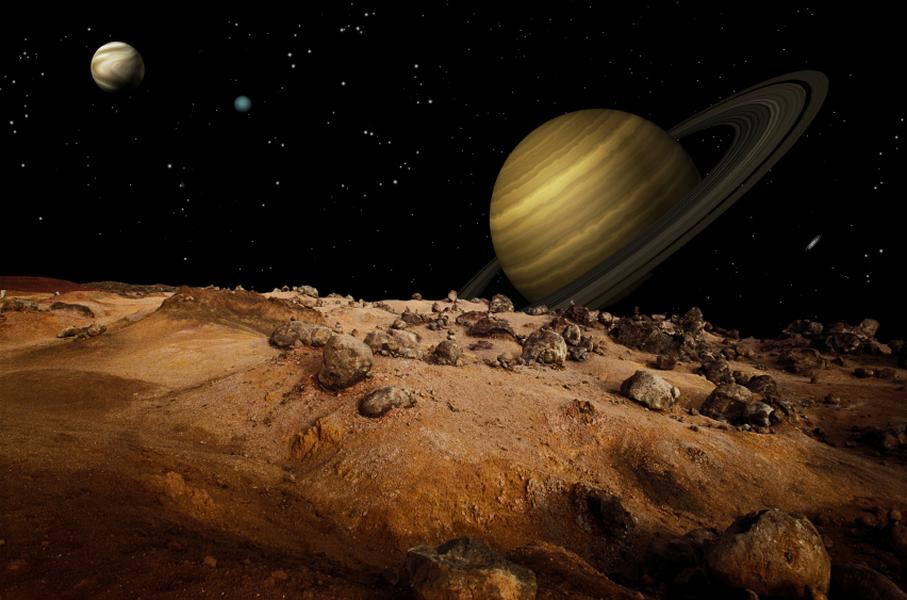Mysterious feature on Saturn's moon baffles NASA scientists


A free daily email with the biggest news stories of the day – and the best features from TheWeek.com
You are now subscribed
Your newsletter sign-up was successful
NASA's Cassini spacecraft has discovered a "mysterious feature" on Saturn's moon Titan. Scientists are working to determine, what, exactly, this feature might be.
NASA reports that the feature is roughly 100 square miles, and it lies in Ligeia Mare, one of Titan's hydrocarbon seas. Cassini's radar has observed the feature twice, but its appearance changed between the two sightings. Scientists suspect the feature's change in appearance could be the result of Titan's changing seasons, which Cassini's current extended mission will monitor.
The feature's first sighting was in July 2013, and the radar images depicted a bright spot, which stood out from the dark sea. Scientists were "perplexed" when the feature couldn't be located with follow-up radar experiments, but they found it again on August 21, 2014.
The Week
Escape your echo chamber. Get the facts behind the news, plus analysis from multiple perspectives.

Sign up for The Week's Free Newsletters
From our morning news briefing to a weekly Good News Newsletter, get the best of The Week delivered directly to your inbox.
From our morning news briefing to a weekly Good News Newsletter, get the best of The Week delivered directly to your inbox.
Though the scientists aren't sure what the feature is, NASA reports that they are "confident" the feature is not a "flaw in their data." Some of their current explanations for the feature include "surface waves, rising bubbles, floating solids, solids suspended just below the surface, or perhaps something more exotic."
Titan's hydrocarbon lakes have long been a source of curiosity for scientists who speculate that life may be able to survive on the moon's surface. "But if life exists on Titan, it would be very different than life on Earth, which is intimately tied to liquid water," Space.com notes.
"Science loves a mystery, and with this enigmatic feature, we have a thrilling example of ongoing change on Titan," Stephen Wall, the deputy team lead of Cassini's radar team, said in a statement. "We're hopeful that we'll be able to continue watching the changes unfold and gain insights about what's going on in that alien sea."
A free daily email with the biggest news stories of the day – and the best features from TheWeek.com
Meghan DeMaria is a staff writer at TheWeek.com. She has previously worked for USA Today and Marie Claire.
-
 Tourangelle-style pork with prunes recipe
Tourangelle-style pork with prunes recipeThe Week Recommends This traditional, rustic dish is a French classic
-
 The Epstein files: glimpses of a deeply disturbing world
The Epstein files: glimpses of a deeply disturbing worldIn the Spotlight Trove of released documents paint a picture of depravity and privilege in which men hold the cards, and women are powerless or peripheral
-
 Jeff Bezos: cutting the legs off The Washington Post
Jeff Bezos: cutting the legs off The Washington PostIn the Spotlight A stalwart of American journalism is a shadow of itself after swingeing cuts by its billionaire owner
-
 Blue Origin launches Mars probes in NASA debut
Blue Origin launches Mars probes in NASA debutSpeed Read The New Glenn rocket is carrying small twin spacecraft toward Mars as part of NASA’s Escapade mission
-
 Dinosaurs were thriving before asteroid, study finds
Dinosaurs were thriving before asteroid, study findsSpeed Read The dinosaurs would not have gone extinct if not for the asteroid
-
 SpaceX breaks Starship losing streak in 10th test
SpaceX breaks Starship losing streak in 10th testspeed read The Starship rocket's test flight was largely successful, deploying eight dummy satellites during its hour in space
-
 Rabbits with 'horns' sighted across Colorado
Rabbits with 'horns' sighted across Coloradospeed read These creatures are infected with the 'mostly harmless' Shope papilloma virus
-
 Lithium shows promise in Alzheimer's study
Lithium shows promise in Alzheimer's studySpeed Read Potential new treatments could use small amounts of the common metal
-
 Scientists discover cause of massive sea star die-off
Scientists discover cause of massive sea star die-offSpeed Read A bacteria related to cholera has been found responsible for the deaths of more than 5 billion sea stars
-
 'Thriving' ecosystem found 30,000 feet undersea
'Thriving' ecosystem found 30,000 feet underseaSpeed Read Researchers discovered communities of creatures living in frigid, pitch-black waters under high pressure
-
 New York plans first nuclear plant in 36 years
New York plans first nuclear plant in 36 yearsSpeed Read The plant, to be constructed somewhere in upstate New York, will produce enough energy to power a million homes
